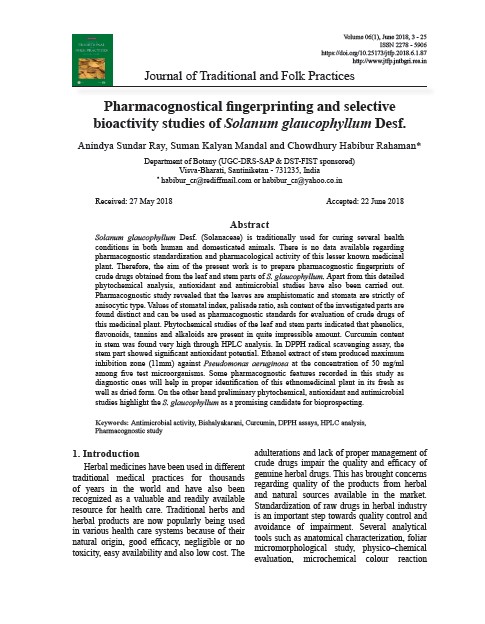Pharmacognostical fingerprinting and selective bioactivity studies of Solanum glaucophyllum Desf.
Keywords:
Antimicrobial activity, Bishalyakarani, Curcumin, DPPH assays, HPLC analysis, Pharmacognostic studyAbstract
Solanum glaucophyllum Desf. (Solanaceae) is traditionally used for curing several health conditions in both human and domesticated animals. There is no data available regarding pharmacognostic standardization and pharmacological activity of this lesser known medicinal plant. Therefore, the aim of the present work is to prepare pharmacognostic fingerprints of crude drugs obtained from the leaf and stem parts of S. glaucophyllum. Apart from this detailed phytochemical analysis, antioxidant and antimicrobial studies have also been carried out. Pharmacognostic study revealed that the leaves are amphistomatic and stomata are strictly of anisocytic type. Values of stomatal index, palisade ratio, ash content of the investigated parts are found distinct and can be used as pharmacognostic standards for evaluation of crude drugs of this medicinal plant. Phytochemical studies of the leaf and stem parts indicated that phenolics, flavonoids, tannins and alkaloids are present in quite impressible amount. Curcumin content in stem was found very high through HPLC analysis. In DPPH radical scavenging assay, the stem part showed significant antioxidant potential. Ethanol extract of stem produced maximum inhibition zone (11mm) against Pseudomonas aeruginosa at the concentration of 50 mg/ml among five test microorganisms. Some pharmacognostic features recorded in this study as diagnostic ones will help in proper identification of this ethnomedicinal plant in its fresh as well as dried form. On the other hand preliminary phytochemical, antioxidant and antimicrobial studies highlight the S. glaucophyllum as a promising candidate for bioprospecting.


